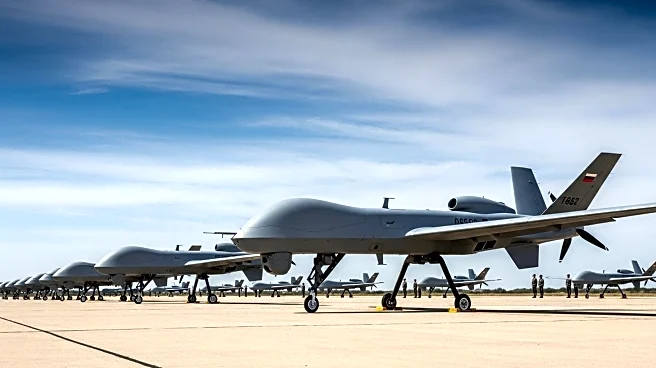What's Happening?
Chinese leader Xi Jinping is showcasing China's military strength through a parade featuring advanced weaponry, including hypersonic missiles and underwater drones, in Beijing. This event marks the 80th anniversary of China's victory in the 'War Against Japanese Aggression and the World Anti-Fascist War.' Despite the display of military might, Xi is addressing internal challenges, notably a corruption purge within the military ranks. Over the past two years, numerous senior military officials and defense industry executives have been removed or have disappeared due to corruption allegations. This crackdown is part of Xi's broader strategy to modernize the People's Liberation Army, aiming to rival the United States' military power by mid-century. Xi's efforts include building the world's largest navy and expanding China's nuclear arsenal, with a focus on preparing for a potential invasion of Taiwan by 2027.
Why It's Important?
The military parade and corruption purge underscore Xi Jinping's commitment to strengthening China's military capabilities and political control. The purge aims to eliminate corruption that could undermine military readiness, particularly concerning Taiwan, which China claims as its territory. Xi's actions reflect his ambition to position China as a global military power, challenging U.S. dominance. The modernization of the military is crucial for China's strategic goals, including national rejuvenation and asserting influence in the Asia-Pacific region. The crackdown on corruption also serves to reinforce Xi's authority and ensure loyalty within the military ranks, which is vital for maintaining political stability and advancing his 'China dream' of global hegemony.
What's Next?
Xi Jinping's ongoing efforts to modernize the military and eliminate corruption are expected to continue, with potential implications for regional security dynamics. The focus on Taiwan remains a critical aspect of China's military strategy, with preparations for a possible invasion by 2027. The U.S. and its allies may respond by strengthening their military presence and alliances in the Asia-Pacific region to counter China's growing influence. Additionally, the internal reshuffling within China's military leadership could lead to further changes in military strategy and operations, impacting China's global military posture.
Beyond the Headlines
The corruption purge within China's military highlights broader issues of governance and political control under Xi Jinping's leadership. The emphasis on loyalty and ideological training within the military reflects Xi's approach to consolidating power and ensuring the Communist Party's dominance. This strategy contrasts with Western military practices that prioritize independent oversight and transparency. The long-term implications of Xi's military reforms could reshape China's role in global geopolitics, influencing international relations and security policies.








